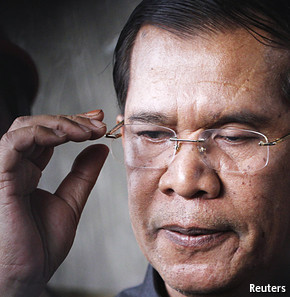The opposition leader vanishes when colleagues need him most

Hun Sen likes to play hard and soft
NEARLY three weeks after Cambodia’s general election, which both the
ruling Cambodian People’s Party (CPP) and the opposition claim to have
won, life in Phnom Penh remains tense. Tanks have been deployed,
although only on the outskirts, and queues have formed at banks and supermarkets
as rumours of hoarding become self-fulfilling. Meanwhile, the National
Election Committee remains coy about releasing the final results of the
poll. It claims that holding off will reduce the risk of violence from
protests called by the opposition.
Still, the election committee has at least now released details of
the popular vote, if not the final seat-count. It says that some 3.2m
Cambodians voted for the CPP and its strongman prime minister, Hun Sen,
and that 2.9m voted for the opposition Cambodian National Rescue Party
(CNRP), led by Sam Rainsy, recently returned from exile. The CPP also
carried most of the provinces. If accurate, these figures seem to back
the preliminary count, which handed the CPP 68 seats in the 123-seat
National Assembly, against 55 for the CNRP.
This is a solid margin, helped by blatant gerrymandering of
districts. But it is a sharply reduced majority for Mr Hun Sen. Compared
with last time round, in 2008, the CPP lost hundreds of thousands of
votes and over a quarter of its seats. The CNRP alleges that the real
setback was far worse, and that the election was grossly rigged in
favour of the governing party. Mr Sam Rainsy hotly contests the result.
Mr Hun Sen is an authoritarian who has ruled Cambodia in one form or
another for 28 years. He is unaccustomed to impudent displays of mass
dissent, which the election on July 28th represents, rigged or not. His
government has since oscillated between angry bluster and adopting a
conciliatory tone towards his opponents.
On the one hand, quantities of razor wire have arrived in the
capital, ready for deployment. Government ministers have threatened a
hard line should the opposition come out in force (to date,
demonstrations have been small and few). One veteran opposition
politician, Pen Sovann, a former prime minister who returned from
obscurity (and a decade in Vietnamese jails) to win
a seat for the CNRP, predicts that “trouble will happen with the people
who could not vote. There will be protests from them, and the
government will see them as a threat.”
At the same time, the prime minister has bowed to CNRP demands for an
inquiry into the election committee’s conduct, with the UN acting as an
independent observer. Allegations are legion of CPP supporters voting
early and often. Voters complain of turning up to find that somebody
else had already voted under their name or that their name was missing
altogether. Since the election, Mr Hun Sen has also been unusually
respectful towards Mr Sam Rainsy, whom he loathes. Some even speculate
that he will somehow try to tempt Mr Sam Rainsy and his party into the
government.
Quite apart from facing a newly invigorated opposition, Mr Hun Sen
also has to shore up his more traditional support. It is clear that the
renowned grassroots organisation of the CPP is not what it was. Of 5.7m
CPP members out of a population of 15m, nearly half failed to vote for
their party. A 40% pay increase has hurriedly been approved for the
poorest civil servants, taking their wages to $80 a month, but this
looks like a case of too little, too late. Meanwhile, speculation is
growing about tensions within the CPP’s senior ranks over Mr Hun Sen’s
handling of the election, including his attempts to bypass party
protocol and have the children of senior CPP officials installed in
parliament.
Even so, given the opposition’s ability to take the wind out of its
own sails, this may not matter much to Mr Hun Sen. In particular, on
August 6th Mr Sam Rainsy chose to leave the country at its most critical
moment in years in order to attend his daughter’s wedding in America.
It is not clear when he intends to return. He has been roundly
criticised for deserting his party. The high regard in which Mr Sam
Rainsy holds himself is not in doubt. But colleagues wonder whether he
has the single-mindedness, still less the ruthlessness, to prise power
from one of Asia’s toughest leaders. After a shocking election tally, Mr
Hun Sen may feel the advantage flowing his way again.

No comments:
Post a Comment